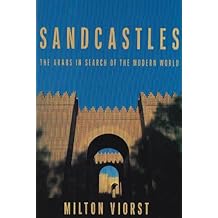
A thoughtful, objective effort ``to convey a sense--perhaps a feel--for Arab society today'' by New Yorker staff writer Viorst (Sands of Sorrow, 1987, etc.). This is not, as Viorst concedes, a systematic and comprehensive work, but rather an impressionistic account--part history, part travelogue, part journalistic interview--of that part of the Arab world that has been at the heart of the Middle Eastern conflict: Iraq, Turkey (included because of its historic connection with the Arabs), Egypt, Syria, Lebanon, Kuwait, Jordan, and the Palestinian area. The Arab states are, Viorst says, ``fragile as sandcastles,'' and their search for accommodation with the modern world has not been successful: ``tyrants and secret-police agencies and corrupt bureaucracies...rule over restive populations by imposing a suffocating conformity, both intellectual and political.''
Viorst finds one explanation for this failure in an inability to accept that the future can be better, since conventional thinking sees the loss of Arab preeminence as reflecting a deviation from Islamic purity. Viorst had remarkable access to the leadership, political and intellectual, in most of the countries, and his reports of their comments, given at length, though sometimes tiresome and uninformative, have the virtue of presenting material not always available--as in his interview with Tariq Aziz, former Iraqi Foreign Minister, who admits that the Iraqis were not misled, by the famous interview with US Ambassador April Glaspie, into thinking that the US would not react to its invasion of Kuwait. A final chapter, written after the peace agreement, provides a useful corrective to some unrealistic expectations.
The Palestinians themselves comment on a lack of democratic institutions, and of a culture of tolerance for differences in opinion. Inevitably only a snapshot of Arab society, but valuable, still, for bringing an informed, intelligent, and remarkably unbiased judgment to a timely subject.
No comments:
Post a Comment